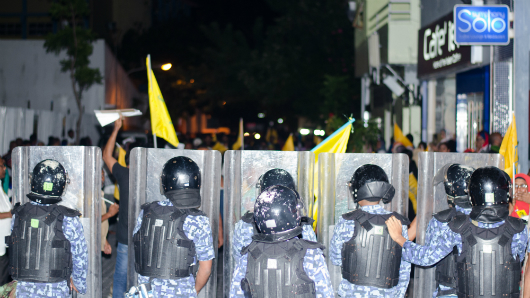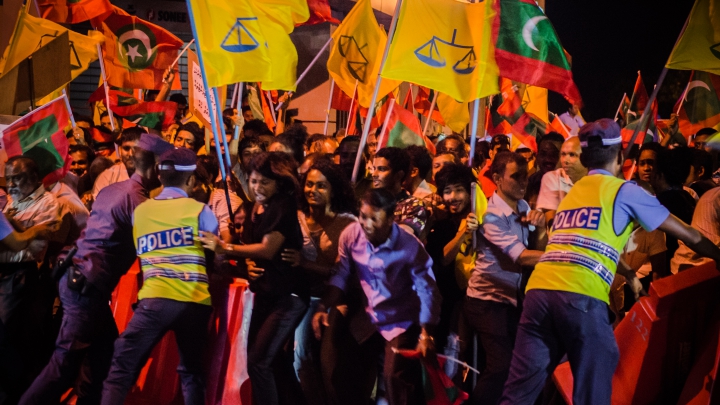Latheefa Ahmed Verall is former President Mohamed Nasheed’s maternal aunt
I was twenty-eight when Maumoon Abdul Gayoom became the president of the Maldives. President Nasir had been demonised and vilified, and a saviour, like a shining beacon of virtue from the deep, ancient bowels of Al- Azhar had appeared. He came in trailing clouds of glory that was Islamic scholarship. I was simply bowled over – to use a phrase that he and I probably share as lovers of cricket!
The year 1978 was an auspicious year for us both. I was expecting my first child; he was starting on his life’s work as the longest ruling dictator of Asia. Our paths never crossed of course because he was in the business of silencing public dissent in a frenzy of torture and authoritarian heavy handedness, while miles away in New Zealand, I was in the business of teaching my students and eventually my own children, the importance of asking the question ‘why’.
I want to talk to you, the readers of this website and also to others in our extremely divided nation, so that you may open your minds enough to listen to the reason why we must never, never give up striving for our rights. Get over the fact that I am [former President Mohamed] Nasheed’s aunt, get over the fact I live over eleven thousand kilometres away. I am 65 years old and smart enough to separate what I want for my nephew and what I want for my country. They are two different things. This is for my country.
For those people who question my right to voice these concerns, I have this to say. My generation in the Maldives had no voice. We did not have the know-how or the belief that we could stand up to what was unfair, corrupt or unjust. Most of us, particularly women, believed that life was about accepting the status quo, being obedient, humble and respectful towards authority and power. That was the world-view we held and we strived to live ’good’ lives within it. We forgot to ask the question why things were the way they were.
When I saw the pictures of Evan Naseem, his dead body beaten and bruised, his hair matted in his own blood, I realised this was an atrocity that had been years in the making. This lack of respect for human life and dignity had its roots years before 2003. My generation had allowed the regime to come to that point of inhumanity because of our impotency and lack of action. I wept as the words, “The only thing necessary for the triumph of evil is for good men to do nothing,” resonated in me. I have never forgotten their significance.
Our impotency came in many guises: we thought bowing down to authority, however unfair, was part of our heritage, we thought it was what our religion demanded of us, we assumed that deference was owed to a ruler simply because he was the ruler and finally we feared that the regime was too powerful to be affected by our concerns.
Today, the imprisonment of Nasheed and the unleashing of the regime’s vendetta on any who disagreed with their Grand Design, are natural progressions for a group of people who had always dealt with problems in a predictable and unimaginative way. They have no answers other than sheer brutality. But now, we the people, no longer find this acceptable. We are no longer prepared to consider it the norm. Those early activists and opposition supporters have helped liberate us all. And all of us working together have finally brought the eyes of the world on the Yameen/Maumoon regime.
[President Abdulla] Yameen, with the same lack of imagination, is following in his brother’s footsteps, and the prisons are once again filling up with their opponents. The events of the last few months scream out the desperation of a group that has once again run out of options: an ex-president jailed by a regime-controlled judiciary who, because of their incompetence and the political pressure of their masters, turned Nasheed’s trial into a farce, a defence minister sentenced for terrorism because of insurmountable differences and divisions in their own dog eat dog cabinet, a predictable falling out with their rich coalition partner who facilitated the regime’s return to power and is currently kept impotent by the threat of financial ruin and finally the country spurned by all freedom loving citizens of the world. Their solution: to move towards a state of emergency because they cannot control the citizenry other than by force.
This mounting opposition to the regime makes it abundantly clear that this is not Nasheed’s fight alone. He is not the only one to suffer brutality and injustice. Under this regime, to various degrees, we have all been within prison walls and we have all suffered from huge injustices. And our fathers, mothers, brothers, uncles, aunts, nieces, nephews and friends have been affected by this cancer that has destroyed the very soul of the country which we hold dear to our hearts.
I am a student of history and I know that in any great struggle between the forces of tradition and modernity or the rights and wellbeing of all people and the greed of the few, the hardest time is when we feel that fortune has taken a dramatic turn for the worse. With Nasheed in prison, the regime in control of the judiciary so that they can dish out their malice willy-nilly, and the police high on testosterone, it may appear that our objectives are all but unattainable.
But life’s great lesson is that this is exactly the time for us to view our achievements and persevere in the face of adversity. The darkest time is always before the dawn. This is the time to have faith in our ability and not give up. This is the time to increase our resolve, increase our determination and increase our action.
Why?
Unlike my generation, today’s Maldivians are not incapacitated by years of tradition and social isolation. The question ‘why’ has been asked. People have dared. And more than that, we have several leaders in prison and this may well be a positive turning point, as for the first time, the eyes of the world are turned on the Maldives as never before. The time is ripe for our action, to actively insist that we do not want a future of brutality and suppression.
The regime believes that by imprisoning Nasheed and other leaders they can curb the move towards democracy and return to the good old days of untrammelled power. But these arrests give all of us the unheralded power to break this regime. We can prove them wrong. They can continue to imprison people, but they cannot suppress an idea. They cannot imprison or beat an ideal.
The time to unhinge this crumbling, ancient relic of a regime is now. This is our time to act.
All comment pieces are the sole view of the author and do not reflect the editorial policy of Minivan News. If you would like to write an opinion piece, please send proposals to [email protected].
Likes (4)Dislikes
(4)Dislikes (1)
(1) 




